Punjab State Board PSEB 12th Class Maths Book Solutions Chapter 7 Integrals Miscellaneous Exercise Questions and Answers.
PSEB Solutions for Class 12 Maths Chapter 7 Integrals Miscellaneous Exercise
Question 1.
\(\frac{1}{x-x^{3}}\)
Solution.
\(\frac{1}{x-x^{3}}=\frac{1}{x\left(1-x^{2}\right)}=\frac{1}{x(1-x)(1+x)}\)
Let \(\frac{1}{x(1-x)(1+x)}=\frac{A}{x}+\frac{B}{(1-x)}+\frac{C}{1+x}\) ………………..(i)
Equating the coefficients of x2, x, and constant term, we get
– A + B – C = 0
B + C = 0, A = 1
On solving these equations, we get
A = 1, B = \(\frac{1}{2}\) and C = – \(\frac{1}{2}\)
From equation (i), we get
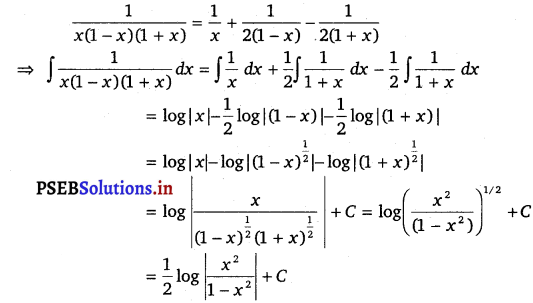
![]()
Question 2.
\(\frac{1}{\sqrt{x+a}+\sqrt{(x+b)}}\)
Solution.
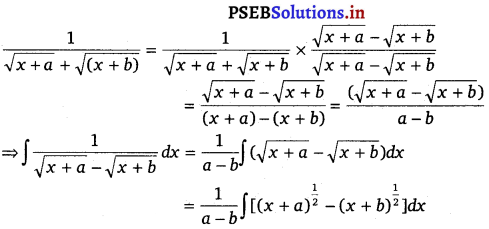
= \(\frac{1}{(a-b)}\left[\frac{(x+a)^{\frac{3}{2}}}{\frac{3}{2}}-\frac{(x+b)^{\frac{3}{2}}}{\frac{3}{2}}\right]\)
= \(\frac{2}{3(a-b)}\left[(x+a)^{\frac{3}{2}}-(x+b)^{\frac{3}{2}}\right]\) + C
Question 3.
\(\frac{1}{x \sqrt{a x-x^{2}}}\) [Hint: Put x = \(\frac{a}{t}\)]
Solution.
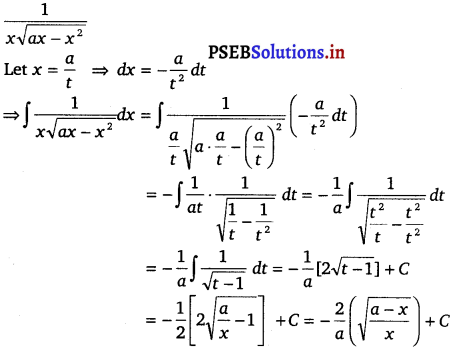
![]()
Question 4.
\(\frac{1}{x^{2}\left(x^{4}+1\right)^{\frac{3}{4}}}\)
Solution.
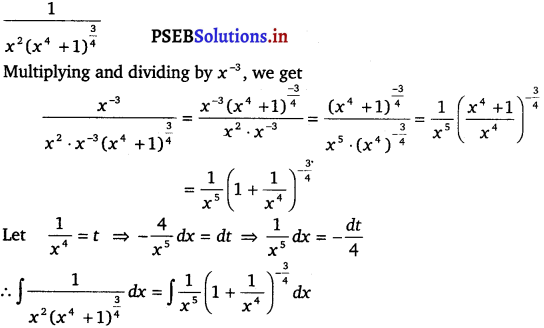
Question 5.
Evaluate: \(\frac{1}{x^{\frac{1}{2}}+x^{\frac{1}{3}}}\) [Hint: \(\), put x = t6]
Solution.
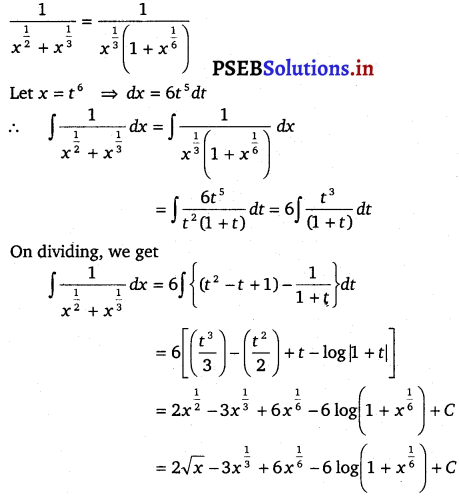
![]()
Question 6.
\(\frac{5 x}{(x+1)\left(x^{2}+9\right)}\)
Solution.
Let \(\frac{5 x}{(x+1)\left(x^{2}+9\right)}=\frac{A}{(x+1)}+\frac{B x+C}{\left(x^{2}+9\right)}\) ………..(i)
⇒ 5x = A(x2 + 9) + (Bx + C) (x + 1)
⇒ 5x = Ax2 + 9A + Bx2 +Bx + Cx + C
Equating the coefficients of x2, x, and constant term, we get
A + B = 0;
B + C = 5;
9A + C = 0
On solving these equations, we get
A = – \(\frac{1}{2}\); B = \(\frac{1}{2}\) and C = \(\frac{9}{2}\)
From equation (i), we get
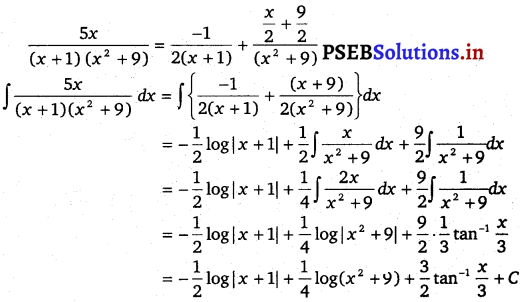
Question 7.
\(\frac{\sin x}{\sin (x-a)}\)
Solution.
\(\frac{\sin x}{\sin (x-a)}\)
Let x – a = t
⇒ dx = dt
∫ \(\frac{\sin x}{\sin (x-a)}\) dx = ∫ \(\frac{\sin (t+a)}{\sin t}\) dt
= ∫ \(\frac{\sin t \cos a+\cos t \sin a}{\sin t}\) dt
= ∫ (cos a + cos t sin a) dt
= t cos a + sin a log |sin t| + C1
= (x – a) cos a + sin a log sin (x – a) + C1
= x cos a + sin a log sin (x – a) – a cos a + C1
= sin a log sin (x – a) + x cos a + C
![]()
Question 8.
\(\frac{e^{5 \log x}-e^{4 \log x}}{e^{3 \log x}-e^{2 \log x}}\)
Solution.

Question 9.
\(\frac{\cos x}{\sqrt{4-\sin ^{2} x}}\)
Solution.
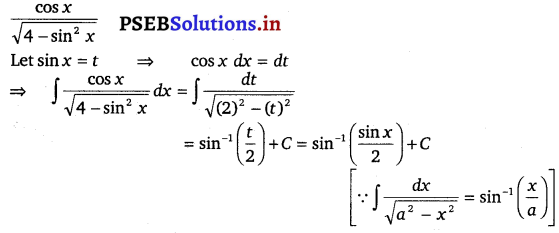
Question 10.
\(\frac{\sin ^{8} x-\cos ^{8} x}{1-2 \sin ^{2} x \cos ^{2} x}\)
Solution.
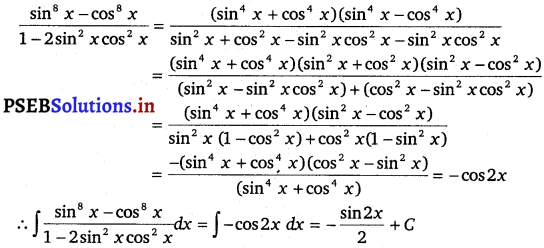
![]()
Question 11.
\(\frac{1}{\cos (x+a) \cos (x+b)}\)
Solution.
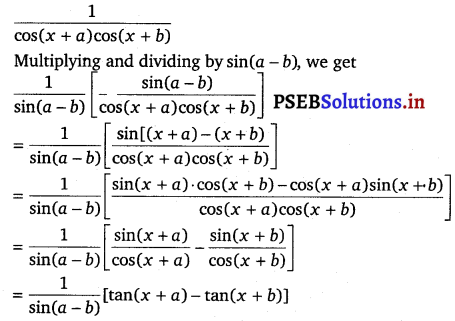

Question 12.
\(\frac{x^{3}}{1-x^{8}}\)
Solution.
\(\frac{x^{3}}{1-x^{8}}\)
Let x4 = t
⇒ 4x3 dx = dt
⇒ \(\int \frac{x^{3}}{\sqrt{1-x^{8}}} d x=\frac{1}{4} \int \frac{d t}{\sqrt{1-t^{2}}}\)
= \(\frac{1}{4}\) sin-1 t + C
= \(\frac{1}{4}\) sin-1 (x4) + C
[∵ ∫ \(\frac{d x}{\sqrt{a^{2}-x^{2}}}=\sin ^{-1}\left(\frac{x}{a}\right)\)]
![]()
Question 13.
\(\frac{e^{x}}{\left(1+e^{x}\right)\left(2+e^{x}\right)}\)
Solution.
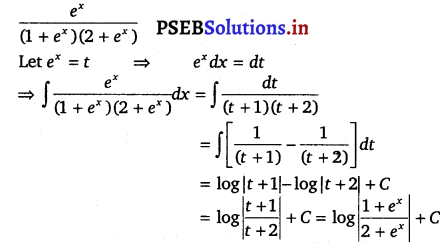
Question 14.
\(\frac{1}{\left(x^{2}+1\right)\left(x^{2}+4\right)}\)
Solution.
\(\frac{1}{\left(x^{2}+1\right)\left(x^{2}+4\right)}=\frac{A x+B}{\left(x^{2}+1\right)}+\frac{C x+D}{\left(x^{2}+4\right)}\) …………..(i)
⇒ 1 = (Ax + B) (x2 + 4) + (Cx + D) (x2 + 1)
⇒ 1 = Ax3 + 4Ax + Bx2 + 4B + Cx3 + Cx + Dx2 + D
Equating the coefficients of x3, x2, x, and constant term, we get
A + C = 0;
B + D = 0;
4A + C = 0;
4B + D = 1
On solving these equations, we get
A = 0, B = 1, C = 0 and D = – \(\frac{1}{3}\)
From equation (i), we get
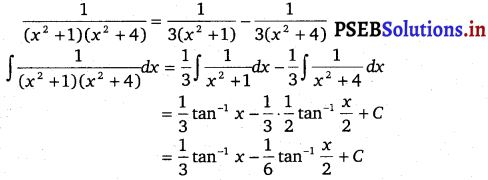
![]()
Question 15.
cos3 x elog sin x
Solution.
cos3 x elog sin x = cos3 × x sin x
Let cos x = t
⇒ – sin x dx = dt
⇒ ∫ cos3 x elog sin x dx = ∫ cos3 x sin x dx
= – ∫ t3 dt
= \(\frac{t^{4}}{4}\) + C
= – \(\frac{\cos ^{4} x}{4}\) + C
Question 16.
e3 log x (x4 + 1)-1
Solution.
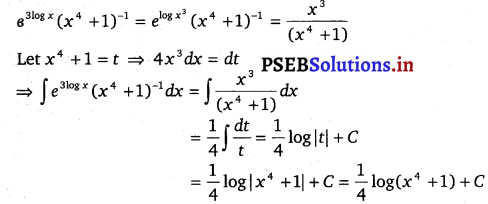
![]()
Question 17.
f'(ax + b) [f(ax + b)]n
Solution.
f'(ax + b) [f(ax + b)]n
Let f (ax + b) = t
⇒ af’(ax + b) dx = dt
⇒ f’(ax + b)[f(ax + b)]n dx = \(\frac{1}{a}\) ∫ tn dt
= \(\frac{1}{a}\left[\frac{t^{n+1}}{n+1}\right]\)
= \(\frac{1}{a(n+1)}\) f(ax + b)n+1 + C
Question 18.
\(\frac{1}{\sqrt{\sin ^{3} x \sin (x+\alpha)}}\)
Solution.
\(\frac{1}{\sqrt{\sin ^{3} x \sin (x+\alpha)}}=\frac{1}{\sqrt{\sin ^{3} x(\sin x \cos \alpha+\cos x \sin \alpha)}}\)
= \(\frac{1}{\sqrt{\sin ^{4} x \cos \alpha+\sin ^{3} x \cos x \sin \alpha}}\)
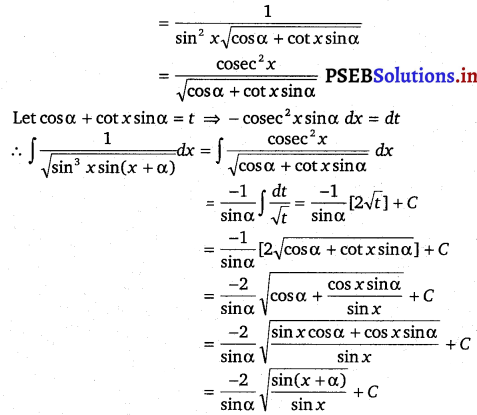
![]()
Question 19.
\(\frac{\sin ^{-1} \sqrt{x}-\cos ^{-1} \sqrt{x}}{\sin ^{-1} \sqrt{x}+\cos ^{-1} \sqrt{x}}\), x ∈ [0, 1]
Solution.
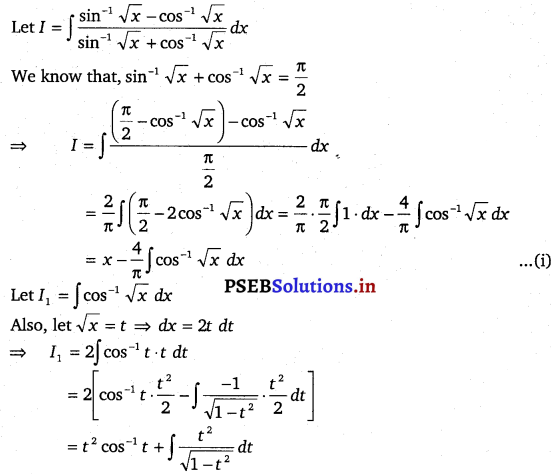
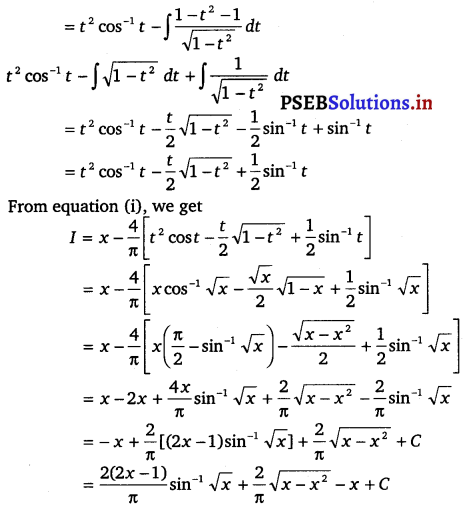
![]()
Question 20.
\(\sqrt{\frac{1-\sqrt{x}}{1+\sqrt{x}}}\)
Solution.
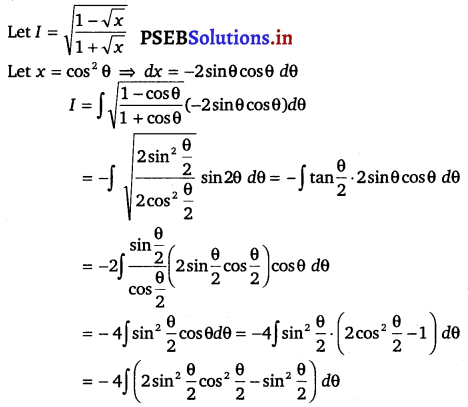
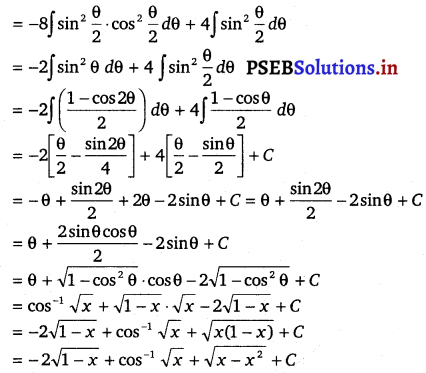
![]()
Question 21.
\(\frac{2+\sin 2 x}{1+\cos 2 x}\) ex
Solution.
Let I = ∫ (\(\frac{2+\sin 2 x}{1+\cos 2 x}\)) ex dx
= ∫ \(\left(\frac{2+2 \sin x \cos x}{2 \cos ^{2} x}\right)\) ex dx
= ∫ \(\left(\frac{1+\sin x \cos x}{\cos ^{2} x}\right)\) ex dx
= ∫ (sec2 x + tan x) ex dx
Let f(x) = tan x
⇒ f’(x) = sec2 x
I = ∫ [f(x) + f'(x)] ex dx
= ex f(x) + C
= ex tan x + C
Question 22.
\(\frac{x^{2}+x+1}{(x+1)^{2}(x+2)}\)
Solution.
\(\frac{x^{2}+x+1}{(x+1)^{2}(x+2)}=\frac{A}{(x+1)}+\frac{B}{(x+1)^{2}}+\frac{C}{(x+2)}\) …………..(i)
⇒ x2 + x + 1 = A (x + 1) (x + 2) + B (x + 2) + C(x2 +2x+1)
⇒ x2 + x + 1 = A(x2 + 3x + 2) + B (x + 2) + C(x2 + 2x + 1)
⇒ x2 + x + 1 = (A + C) x2 + (3A +B + 2C) x + (2A + 2B + C)
Equating the coefficients of x2, x, and constant term, we get
A + C = 1;
3A + B + 2C = 1;
2A + 2B + C = 1
On solving these equations, we get
A = – 2, B = 1 andC = 3
From equation (i), we get
∫ \(\frac{x^{2}+x+1}{(x+1)^{2}(x+2)}\) dx = \(-2 \int \frac{1}{x+1} d x+3 \int \frac{1}{(x+2)} d x+\int \frac{1}{(x+1)^{2}} d x\)
= – 2 log |x + 1| + 3 log |x + 2| – \(\frac{1}{(x+1)}\) + C.
![]()
Question 23.
tan-1 \(\sqrt{\frac{1-x}{1+x}}\)
Solution.
Let I = ∫ tan-1 \(\sqrt{\frac{1-x}{1+x}}\) dx
Let x = cos θ
⇒ dx = – sin θ dθ
I = ∫ tan-1 \(\sqrt{\frac{1-\cos \theta}{1+\cos \theta}}\) (- sin θ dθ)
= – ∫ tan-1 \(\sqrt{\frac{2 \sin ^{2} \frac{\theta}{2}}{2 \cos ^{2} \frac{\theta}{2}}}\) sin θ dθ
= – ∫ tan-1 tan \(\frac{\theta}{2}\) . sin θ dθ
= – \(\frac{1}{2}\) ∫ θ . sin θ dθ
= – \(\frac{1}{2}\) [θ – cos θ] – ∫ 1 . (- cos θ) dθ
= – \(\frac{1}{2}\) [- θ cos θ + sin θ]
= + \(\frac{1}{2}\) θ cos θ – \(\frac{1}{2}\) sin θ
= \(\frac{1}{2}\) cos-1 x . x – \(\frac{1}{2}\) \(\sqrt{1-x^{2}}\) + C
= \(\frac{x}{2}\) cos-1 x – \(\frac{1}{2}\) \(\sqrt{1-x^{2}}\) + C
= \(\frac{1}{2}\) [x cos-1 x – \(\sqrt{1-x^{2}}\)) + C
Question 24.
\(\frac{\sqrt{x^{2}+1\left[\log \left(x^{2}+1\right)-2 \log x\right]}}{x^{4}}\)
Solution.
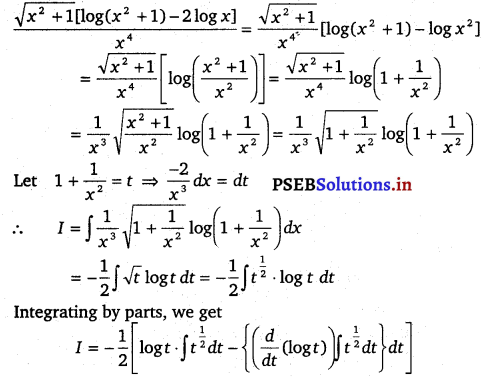
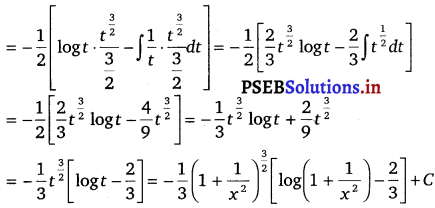
![]()
Direction (25 – 33): Evaluate the definite integral.
Question 25.
\(\cdot \int_{\frac{\pi}{2}}^{\pi} e^{x}\left(\frac{1-\sin x}{1-\cos x}\right)\) dx
Solution.
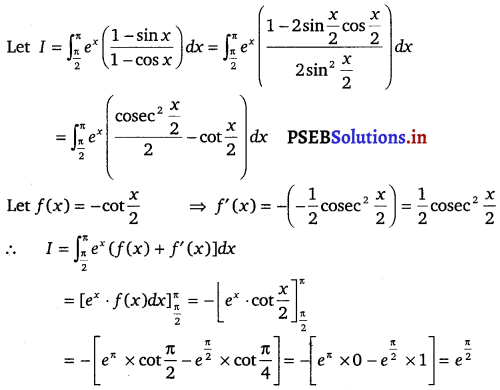
Question 26.
\(\int_{0}^{\frac{\pi}{4}} \frac{\sin x \cos x}{\cos ^{4} x+\sin ^{4} x}\) dx
Solution.
Let I = \(\int_{0}^{\frac{\pi}{4}} \frac{\sin x \cos x}{\cos ^{4} x+\sin ^{4} x}\) dx
= ∫ \(\int_{0}^{\frac{\pi}{4}} \frac{\cos ^{4} x}{\frac{\cos ^{4} x+\sin ^{4} x}{\cos ^{4} x}}\) dx
= ∫ \(\int_{0}^{\frac{\pi}{4}} \frac{\tan x \sec ^{2} x}{1+\tan ^{4} x}\) dx
Let tan2 x = t
⇒ 2 tan x sec2 x dx = dt
When x = 0, t = 0 and when x = \(\frac{\pi}{4}\), t = 1
∴ I = \(\frac{1}{2}\left[\tan ^{-1} t\right]_{0}^{1}\)
= \(\frac{1}{2}\) [tan-1 1 – tan-21 0]
= \(\frac{1}{2}\left[\frac{\pi}{4}\right]=\frac{\pi}{8}\)
![]()
Question 27.
\(\int_{0}^{\frac{\pi}{2}} \frac{\cos ^{2} x d x}{\cos ^{2} x+4 \sin ^{2} x}\) dx
Solution.
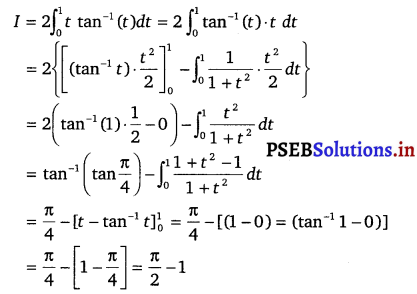
Let 2 tan x = t
⇒ 2 sec2 x dx = dt
When x = 0, t = 0 and when x = \(\frac{\pi}{2}\), t = ∞
⇒ I = \(\int_{0}^{\frac{\pi}{2}} \frac{2 \sec ^{2} x}{1+4 \tan ^{2} x} d x=\int_{0}^{\infty} \frac{d t}{1+t^{2}}\)
= \(\left[\tan ^{-1} t\right]_{0}^{\infty}\)
= [tan (∞) – tan (o)] = \(\frac{\pi}{2}\)
Therefore, from Eq. Ci), we get
I = \(-\frac{\pi}{6}+\frac{2}{3}\left[\frac{\pi}{2}\right]=\frac{\pi}{3}-\frac{\pi}{6}=\frac{\pi}{6}\)
Question 28.
\(\int_{\frac{\pi}{6}}^{\frac{\pi}{3}} \frac{\sin x+\cos x}{\sqrt{\sin 2 x}}\)
Solution.
Let I = \(\int_{\frac{\pi}{6}}^{\frac{\pi}{3}} \frac{\sin x+\cos x}{\sqrt{\sin 2 x}}\) dx
= \(\int_{\frac{\pi}{6}}^{\frac{\pi}{3}} \frac{(\sin x+\cos x)}{\sqrt{-(-\sin 2 x)}}\) dx
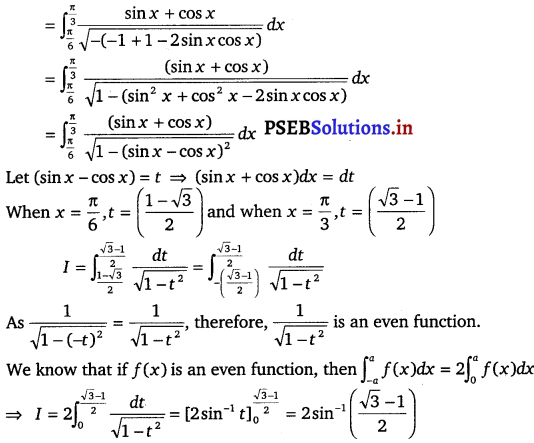
![]()
Question 29.
\(\int_{0}^{1} \frac{d x}{\sqrt{1+x}-\sqrt{x}}\)
Solution.
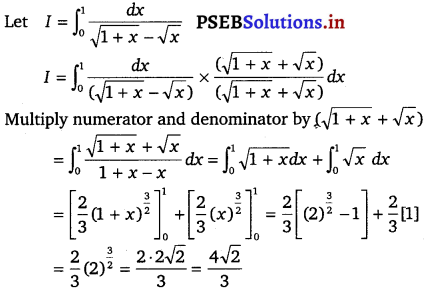
Question 30.
\(\int_{0}^{\frac{\pi}{4}} \frac{\sin x+\cos x}{9+16 \sin 2 x}\) dx
Solution.
Let I = \(\int_{0}^{\frac{\pi}{4}} \frac{\sin x+\cos x}{9+16 \sin 2 x}\) dx
Also, let sin x – cos x = t
⇒ (cos x + sin x) dx = dt
When x = 0, t= – 1 and when x =\(\frac{\pi}{4}\), t = 0
⇒ (sin x – cosx)2 = t2
⇒ sin2 x + cos2 x – 2 sin x cos x = t2
⇒ 1 – sin 2x = t2
⇒ sin 2x = 1 – t2

Question 31.
\(\int_{0}^{\frac{\pi}{2}}\) sin 2x tan-1 (sin x) dx
Solution.
Let I = \(\int_{0}^{\frac{\pi}{2}}\) sin 2x tan-1 (sin x) dx
= 2 \(\int_{0}^{\frac{\pi}{2}}\) sin x cos x tan-1 (sin x) dx
Let sin x = t
cos dx = dt
when x = 0 , t = 0 and when x = \(\frac{\pi}{2}\), then t = 1

Question 32.
\(\int_{0}^{\pi} \frac{x \tan x}{\sec x+\tan x}\) dx
Solution.
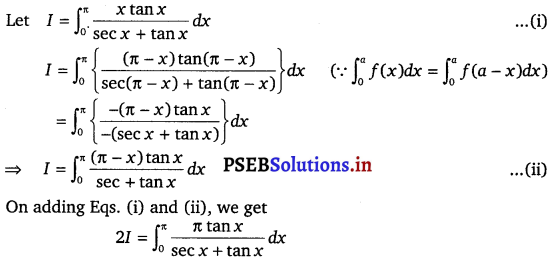
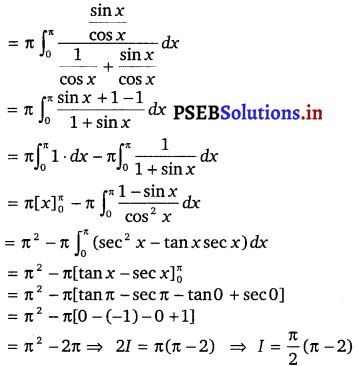
![]()
Question 33.
\(\int_{1}^{4}\) [|x – 1| + |x – 2| + |x – 3|] dx
Solution.
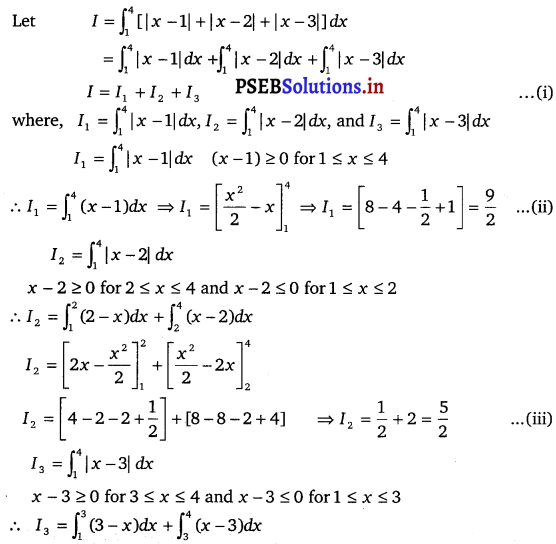
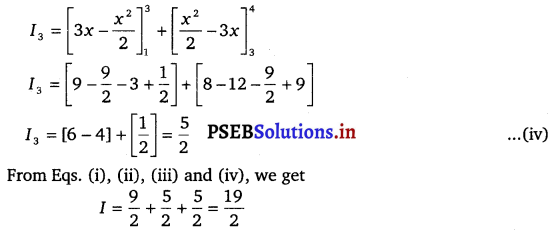
![]()
Direction (34 – 39): Prove the following:
Question 34.
\(\int_{1}^{3} \frac{d x}{x^{2}(x+1)}=\frac{2}{3}+\log \frac{2}{3}\)
Solution.
Let I = \(\int_{1}^{3} \frac{d x}{x^{2}(x+1)}\)
Also, let \(\frac{1}{x^{2}(x+1)}=\frac{A}{x}+\frac{B}{x^{2}}+\frac{C}{x+1}\)
1 = Ax (x + 1) + B(x + 1) + C (x2)
1 = Ax2) + Ax + Bx + B + Cx2)
Equating the coefficients of x2), x and constant term, we get
A + C = 0;
A + B = 0;
B = 1
On solving these equations, we get
A = – 1; C = 1 and B = 1
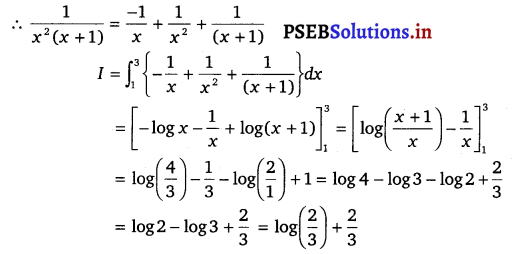
Hence, the given result is proved.
Question 35.
\(\int_{0}^{1}\) x ex dx = 1
Solution.
Let I = \(\int_{0}^{1}\) x ex dx dx
Integrating by parts, we get
I = \(x \int_{0}^{1} e^{x} d x-\int_{0}^{1}\left\{\left(\frac{d}{d x}(x)\right) \int e^{x} d x\right\}\) dx
= \(\left[x e^{x}\right]_{0}^{1}\) – \(\int_{0}^{1}\) ex dx
= \(\left[x e^{x}\right]_{0}^{1}-\left[e^{x}\right]_{0}^{1}\)
= e – e + 1 = 1
Hence, the given result is proved.
![]()
Question 36.
\(\int_{-1}^{1}\) x17 cos4 x dx
Solution.
Let I = \(\int_{-1}^{1}\) x17 cos4 x dx
Also, f(x) = (- x)17 cos4 (- x)
= – x17 cos4 x = – f(x)
Therefore, f(x) is an odd function.
We know that if f(x) is an odd function, then \(\int_{-a}^{a}\) f(x) dx = o
∴ I = \(\int_{-1}^{1}\) x17 cos4 x dx = o
Hence, the given result is proved.
![]()
Question 37.
\(\int_{0}^{\frac{\pi}{2}}\) sin2 x dx = \(\frac{2}{3}\)
Solution.
Let I = \(\int_{0}^{\frac{\pi}{2}}\) sin2 x dx
= \(\int_{0}^{\frac{\pi}{2}}\) sin3 x sin x dx
= \(\int_{0}^{\frac{\pi}{2}}\) (1 – cos2 x) sin x dx
= \(\int_{0}^{\frac{\pi}{2}}\) sin x dx – \(\int_{0}^{\frac{\pi}{2}}\) cos2 x sin x dx
= \([-\cos ]_{0}^{\frac{\pi}{2}}+\left[\frac{\cos ^{3} x}{3}\right]_{0}^{\frac{\pi}{2}}\)
= \(1+\frac{1}{3}[-1]=1-\frac{1}{3}=\frac{2}{3}\)
Hence, the given result is proved.
Question 38.
\(\int_{0}^{\frac{\pi}{4}}\) 2 tan3 x dx = 1 – log 2
Solution.
Let I = \(\int_{0}^{\frac{\pi}{4}}\) 2 tan3 x dx
= 2 \(\int_{0}^{\frac{\pi}{4}}\) tan2 x tan x dx
= 2 \(\int_{0}^{\frac{\pi}{4}}\) (sec2 x – 1) tan x dx
= 2 \(\int_{0}^{\frac{\pi}{4}}\) sec2 x tan x dx – 2 \(\int_{0}^{\frac{\pi}{4}}\) tan x dx
= \(2\left[\frac{\tan ^{2} x}{2}\right]_{0}^{\frac{\pi}{4}}+2[\log \cos x]_{0}^{\frac{\pi}{4}}\)
=1 + 2 [log cos \(\frac{\pi}{4}\) – log cos 0]
= 1 + 2 [log \(\frac{1}{\sqrt{2}}\) – log 1]
= 1 – log 2 – log 1
= 1 – log 2
Hence, the given result is proved.
![]()
Question 39.
\(\int_{0}^{1} \sin ^{-1} x d x=\frac{\pi}{2}-1\)
Solution.
Let I = \(\int_{0}^{1}\) sin-1 x dx
= \(\int_{0}^{1}\) sin-1 x . 1. dx
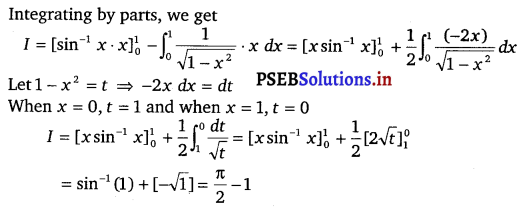
Hence, the given result is proved.
Question 40.
Eva1uate \(\int_{0}^{1}\) e2 – 3x dx as a limit of a sum.
Solution.
Let I = \(\int_{0}^{1}\) e2 – 3x dx
We know that,
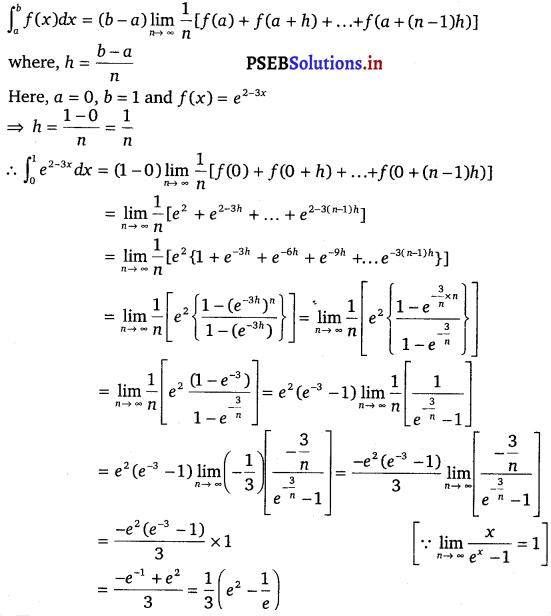
Direction (41 – 44): Choose the correct answer:
Question 41.
\(\int \frac{d x}{e^{x}+e^{-x}}\) is equal to
(A) tan-1 (ex) + C
(B) tan-1 (ex) + C
(C) log (ex – e-x) + C
(D) log (ex + e-x) + C
Solution.
Let I = \(\int \frac{d x}{e^{x}+e^{-x}}\)
= ∫ \(\frac{e^{x}}{e^{2 x}+1}\) dx
Also, let ex = t
⇒ ex dx = dt
∴ I = ∫ \(\frac{d t}{1+t^{2}}\) tan-1 t + C
= tan-1 (ex) + C
Hence, the correct answer is (A).
Question 42.
∫ \(\frac{\cos 2 x}{(\sin x+\cos x)^{2}}\) dx is equal to
(A) \(\frac{-1}{\sin x+\cos x}\)
(B) log |sin x + cos x| + C
(C) log |sin x – cos x| + C
(D) \(\frac{1}{(\sin x+\cos x)^{2}}\)
Solution.

Let cos x + sin x = t
⇒ (cos x – sin x) dx = dt
∴ I = \(\int \frac{d t}{t}\)
= log |t| + C
= log |cos x+ sin x| + C
Hence, the correct answer is (B).
Question 43.
If f(a + b – x) = f(x), then \(\int_{a}^{b}\) x f(x) dx is equal to
(A) \(\frac{a+b}{2} \int_{a}^{b} f(b-x)\) dx
(B) \(\frac{a+b}{2} \int_{a}^{b} f(b+x)\) dx
(C) \(\frac{b-a}{2} \int_{a}^{b} f(x)\) dx
(D) \(\frac{b+a}{2} \int_{a}^{b} f(x)\) dx
Sol.
Let I = \(\int_{a}^{b}\) x f(x) dx …………….(i)
= \(\int_{a}^{b}\) (a + b – x) f (a + b – x) dx
[∵ \(\int_{a}^{b}\) f(x) dx = \(\int_{a}^{b}\) f(a + b – x) dx]
= \(\int_{a}^{b}\) (a + b – x) f(x) dx
⇒ I = (a + b) \(\int_{a}^{b}\) f(x) dx – I [Using Eq.(i)]
⇒ I = (a + b) \(\int_{a}^{b}\) f(x) dx
⇒ 2I = (a + b) \(\int_{a}^{b}\) f(x) dx
= \(\left(\frac{a+b}{2}\right) \int_{a}^{b} f(x) d x\)
Hence, the correct answer is (D).
Question 44.
The value of \(\int_{0}^{1} \tan ^{-1}\left(\frac{2 x-1}{1+x-x^{2}}\right)\) dx is
(A) 1
(B) 0
(C) – 1
(D) \(\frac{\pi}{4}\)
Solution.
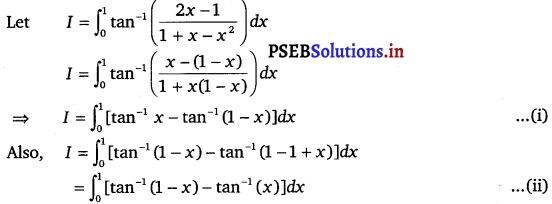
Adding Eqs. (i) and (ii), we get
2I = \(\int_{0}^{1}\) (tan-1 x + tan-1 (1 – x) – tan-1 (1 – x) – tan-1 x dx
⇒ 2I = 0
⇒ I = 0
Hence, the correct answer is (B).
